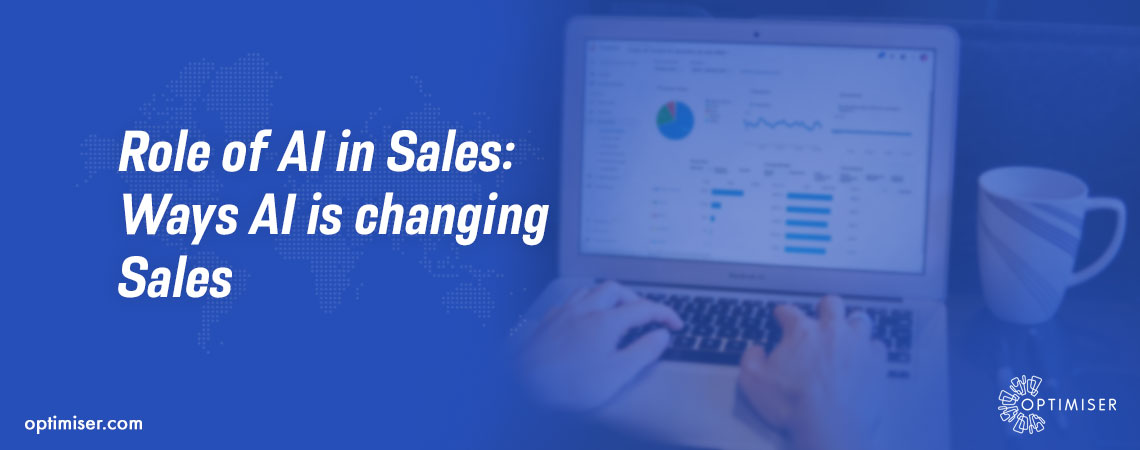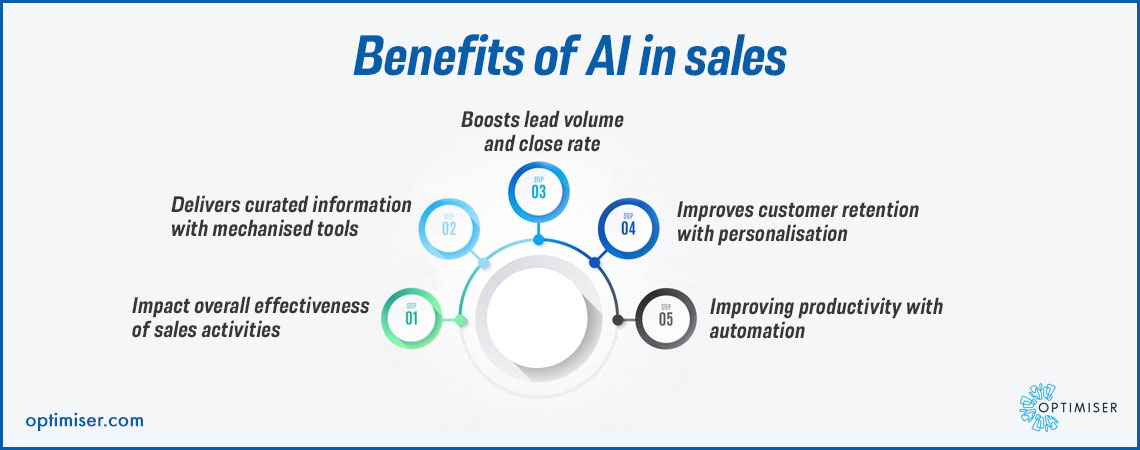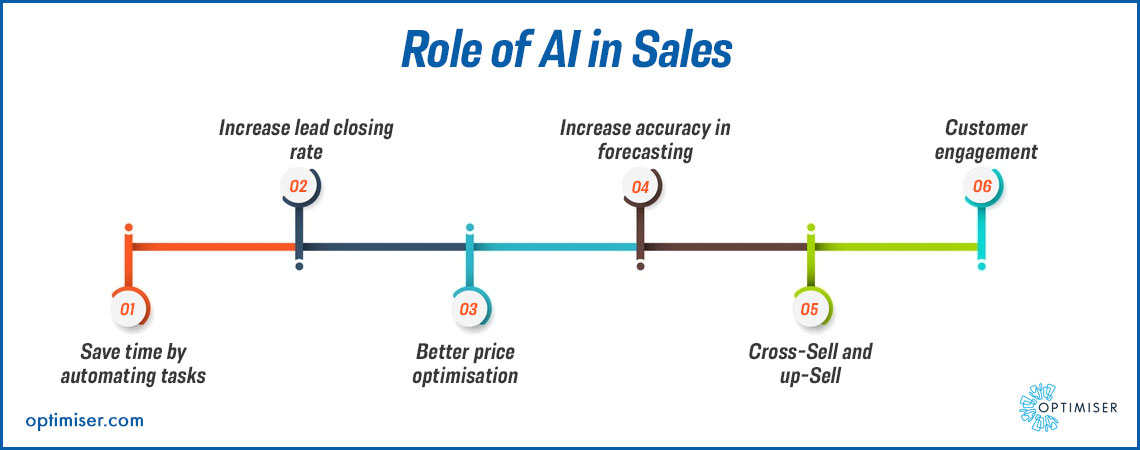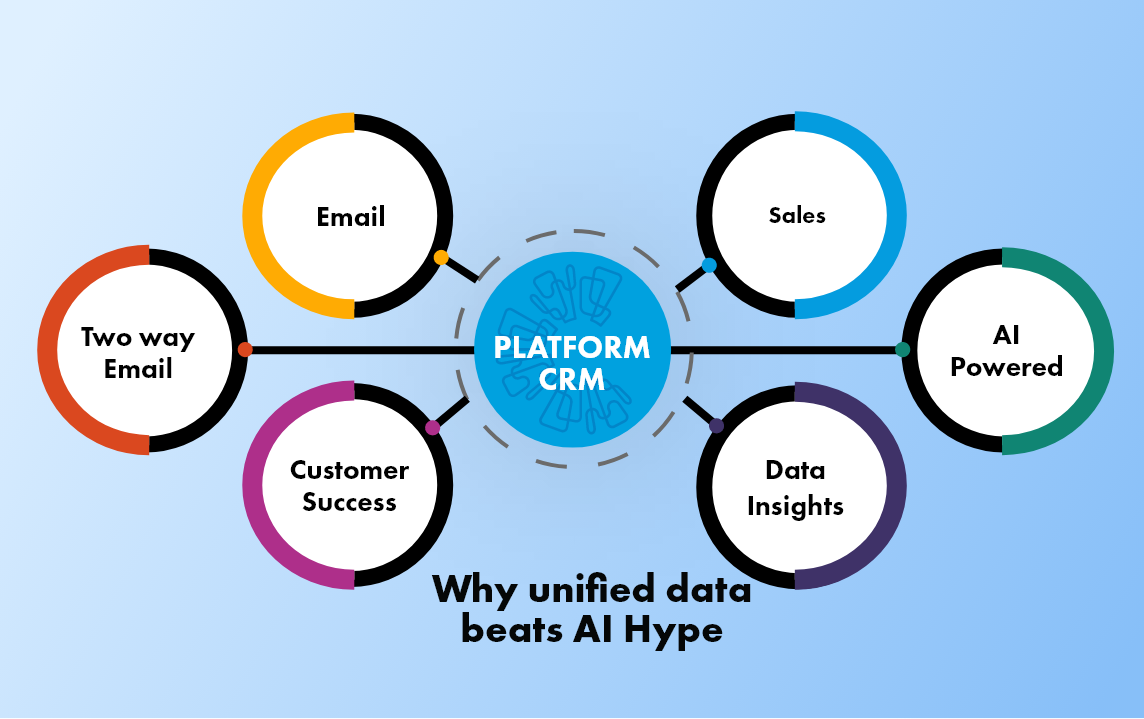
Role of AI in Sales: Ways AI is Changing Sales
Artificial intelligence takeover has been monumental for every industry. Nearly one in four sales teams use AI to make better sales and streamline the sales processes. Organisations have started to invest in AI to get a big break in the competitive industry. BY 2028, the global artificial intelligence market will reach $641.3 billion.
Making lives automated and straightforward, AI has also reformed our day-to-day lives. For example, customer-facing domains like sales and customer service using AI for automated responses and good relationships with customers.

Role of AI in Sales
Without replacing the human seller, AI allows a business to optimise its sales performance with curated information and automation tools. Helping in making better decision-making and prospecting, AI's unique insights can help the agents to focus on solving customers' problems and making their journey as seamless as possible.
1. Save time by automating tasks
Sales reps have the main focus, which is selling. However, many tedious tasks need their attention. For example, meeting notes, emailing them and storing them can take time. As per a survey, most of the sales agent's time is spent on administrative tasks rather than on selling. But more than 50% of the sales agents have reported that using AI has made them far more efficient and productive. It has cut down the mundane tasks and reduced the unnecessary ones that need no cognitive skills. It can track the communication history with the customers that can be accessed at any given point of time and event meeting notes. It allows the agents to dig into the customer's pain points to nurture the consumer better.
2. Increase lead closing rate
AI in sales saves time a lot. It can gather data from prospects, conduct follow-ups, send automated responses, schedule sales discovery calls etc. Furthermore, it can help the sales team analyse the customers' buying behaviour. These allow the sales team to track leads with a higher chance of closing. Rather than depending on the outdated lead scoring system or vague instincts, you can use historical data to track the probability of the lead turning into a paying customer. Then, you can focus your efforts on that lead and use the algorithm compiled data to boost lead volume. By automating tasks and augmenting them, AI also helps in revenue generation.
3. Better price optimisation
Discounts are effective for increasing conversion rates. But these tend to be time-sensitive. Having the right discount strategy is tricky. However, you will not need to guess the discount rate with AI. Machine learning can be used to collect information on sales from customers. This data includes successful past transactions, location, size, timing, decision-makers, the budget amount, industry of service, company size, annual revenues, private/ public company etc.
AI-enabled pricing ensures personalisation that brings in more customers, and sales teams do not have to deploy a new pricing system every time. In addition, it removes the chance of the back-and-forth negotiations of the prices.
4. Increase accuracy in forecasting
Forecasting is incredibly vital for every sales team. It is the process of estimating the revenue generated by predicting the amount of product/ service unit an individual salesperson will sell in the next week/ month/ quarter/ or year. Performance, payroll, and hiring depend on sales forecasting, and any missed forecast can profoundly impact a company's credibility.
AI optimally uses inventories and resources as per the prediction and gives out a detailed report about the real-time view of the sales and what to expect from the next quarter to the sales managers.

5. Cross-Sell and up-Sell
Cross-selling and upselling are economical, and they increase the selling rate and the sales volume. But knowing who to sell to can be extremely tricky. It can put off a potential customer from purchasing from you again if you try to persuade them into buying additional services. This can impact your retention rate and increase the churn rate.
By leveraging AI, you can segment customers that are likely to accept an upgrade of their existing plans and are willing to buy a new product from you.
6. Customer engagement
For any business to succeed, making the customer happy is essential. Focusing on cultivating loyalty and trust, these qualities can ensure that you forge long-lasting relationships.
It can be a bit of trouble for sales agents to keep the customers engaged without backup information. AI tools allow them to make a connection with the buyers. They can track the digital behaviour of the buyers based on previous interactions with the company.
Because sales reps can save more than 40% of their time by using AI to collect data, they have a higher chance of closing leads and revving up the revenue.
Summary
AI makes the sales team extremely efficient; there is no doubt about it. Customers can interact with a business without much human intervention using AI chatbots and online transactions. But worry not the human touch will never disappear from sales as it still requires clarifying ambiguity, making sales calls, building relationships and selecting the AI data to be leveraged.

30 days free trial. No credit card required
 One powerful platform
One powerful platform
 Simple to use
Simple to use
 Comprehensive
Comprehensive



